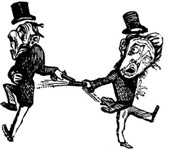
Principle vs. Prudence
LETTER FROM ENGLAND
“But if it’s like that,” I grumbled, “if this part of moral theology is as clear-cut and traditional and restrictive as you say, why does it get so little effective emphasis from priests and bishops and popes?”
I was speaking to an expert on such subjects, and he responded to my question with a somewhat wicked grin. “The polite answer is that they’re held back by pastoral prudence!”
“How do you mean?”
“Well, we’re supposed to accept persecution if it comes, even martyrdom, but not to court such tests and trials; so where moral principle is exceptionally likely to infuriate Caesar, it needs exceptionally careful handling.”
“And what’s the less polite answer?”
“Priests and bishops and popes are usually good men, often very good men. But they’re still only men, not always capable of really heroic courage. How did the priests and bishops of Nazi Germany respond to Hitler’s wars? Mind you, I’m not casting the first stone at anybody. I don’t suppose my own courage is all that heroic; I feel no yearning for the martyr’s crown.”
And so the argument went on.
I had a dream that night. I seemed to be in a building of the ecclesiastical or collegiate sort, vaguely archaic in style, possibly medieval, but not clearly definable in terms of place or period. A priest of scholarly appearance was writing peacefully at his table.
You May Also Enjoy
The October 5, 1992, issue of The Times carried a troubling, but not atypical, news…
Pagan or occultic feminism finds all the problems of mankind focused in patriarchy, thus effectively blinding feminism to the sin resident also in the heart of woman.
Rather than mustering the courage to stand alone, Catholics find it easier to follow popular American political opinion.

